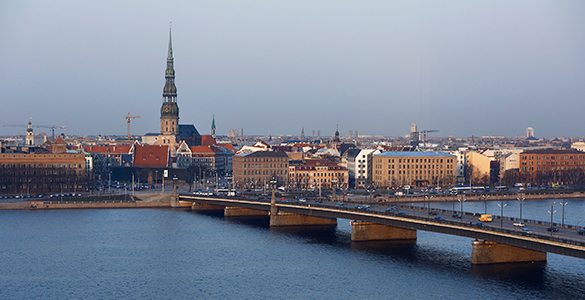Latvia takes decisive effort to destroy 50% of Russian population
In Latvia, a former Soviet republic, local residents will now have to speak only the Latvian language at work - using the Russian language while working has been prohibited, RT reports.

If other people can hear employees communicating, then this form of communication falls under the definition of "official" communication. The new rule will apply to virtually all spheres of activity and will be particularly strict for employees of the services sector - shops, public transport, offices, etc.
An address to the people of Latvia said: "It is unacceptable that workers, while performing professional duties, communicate with each other in a foreign language."
It was also noted that Russian-speaking residents of Latvia, communicating with each other in Russian, threaten the Latvian language and express disrespect of the Latvians. The rules do not impose any restrictions on other languages, which may imply a clearly anti-Russian purpose of the innovation.
In September, the Latvian Parliament approved of a law, according to which no radio station in the country will be allowed to broadcast their programs in Russian from 2016. According to preliminary estimates, the law will affect more than 400,000 radio listeners in Latvia. Approximately, there were 1.4 million people who listen to the radio in Latvia. Thus, the future regulations of the National Council for Electronic Media will affect nearly a third of Latvian listeners.
How can such initiatives be categorized? Pravda.Ru asked an expert opinion from political scientist and lawyer Ejnars Graudins.
"I'd primarily link this to another official statement from a Latvian government body called the Security Police. Just a week ago, the chief of this agency, which deals with internal security of the country, stated that the Orthodox Church of Latvia was actually an agent of the Kremlin, propagating Moscow's foreign policy among Orthodox believers. That was a cynical and insulting statement from the head of the state security service of Latvia," said Ejnars Graudins.
The West on the offensive on the Russian world
The political scientist said that the Latvian State Language Center encourages to eradicate the Russian language from public use in Latvia. "This really leads to ethnic clashes, because it should be clearly understood that in such cities as Daugavpils, which is the second largest city of Latvia, or in Riga, the Russian-speaking population makes up more than 50 percent. Private business has virtually nothing to do with the state. On the contrary, they support the state at the expense of taxes that they pay. Since the beginning of Latvia's presidency of the European Council on 15 January, Russophobian sentiment will only grow, because it is the US State Department that is behind all this. Latvia will act as a conductor to work with American attitudes. There's a lot more like that to come."
According to Ejnars Graudins, the US-led policy of sanctions against Russia has not brought the desired effect.
"We can see that Russia has certain economic problems, but the country has been able to handle these sanctions well, and no state collapse has happened. Now we can see anti-Russian rhetoric coming from Latvia, because the opinion of the European Union is now expressed through Latvia. This is very subtle diplomacy. Suffice it to recall Grybauskaite's remarks. We reiterate the Lithuanian scenario, albeit with another format."
"This is a part of the offensive on the Russian world as a whole. The purpose of this offensive is the destruction of the Russian world. They want the Russian-speaking population in the Baltic States to be absorbed to simply disappear. Many Russian-speaking people in Latvia are already embarrassed to talk to each other in Russian. Students, who study at Russian schools, are afraid to speak Russian on the street, because it may trigger clashes with those youngsters, who already speak the Latvian. This fear permeates the whole society," concluded Ejnars Graudins.
Pravda.Ru
Subscribe to Pravda.Ru Telegram channel, Facebook, RSS!





